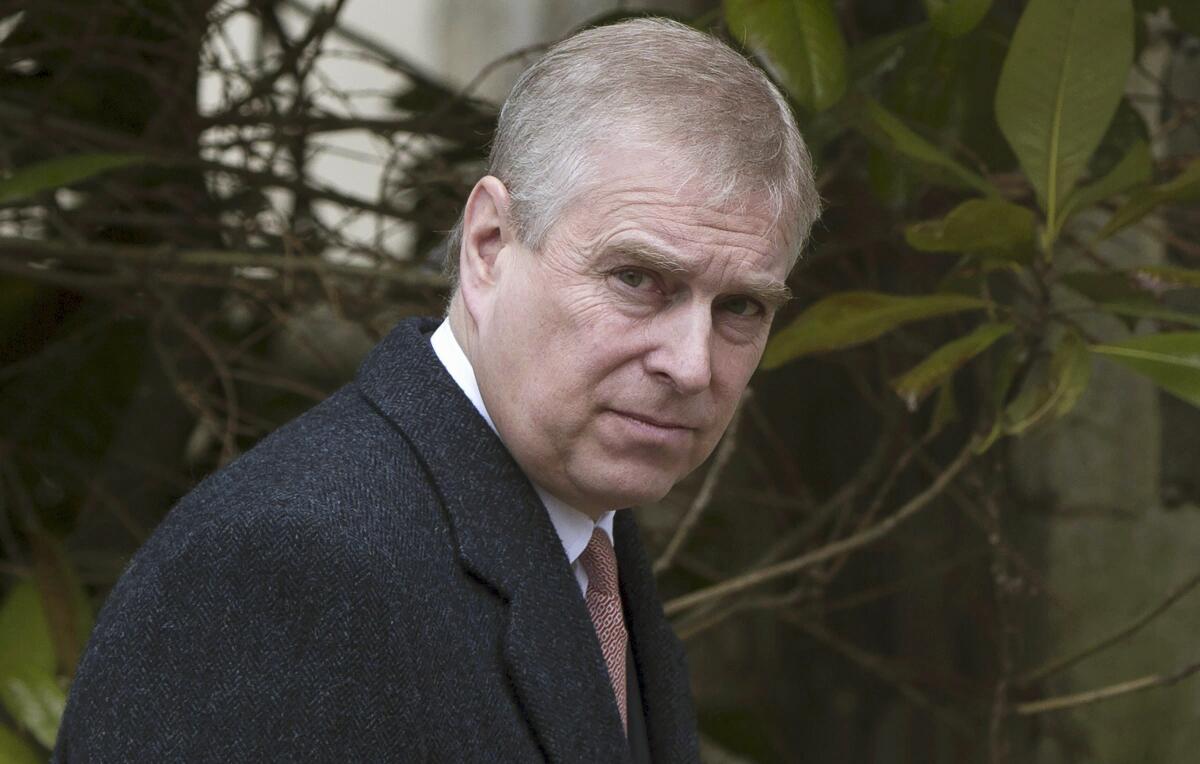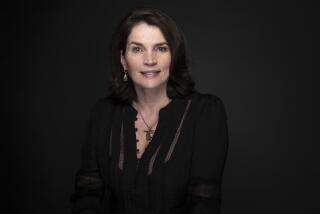Lawsuit against Prince Andrew to go ahead despite Epstein deal

- Share via
NEW YORK — A judge has, for now, refused to dismiss a lawsuit against Britain’s Prince Andrew by an American woman who says he sexually abused her when she was 17.
Stressing Wednesday that he wasn’t ruling on the truth of the allegations, U.S. District Judge Lewis A. Kaplan rejected an argument by Andrew’s lawyers that Virginia Giuffre’s lawsuit should be thrown out at an early stage because of an old legal settlement she had with Jeffrey Epstein, the financier she claims set up sexual encounters with the prince.
Kaplan said the $500,000 settlement between Epstein and Giuffre didn’t involve the prince and doesn’t bar a suit against him now.
Giuffre sued the 61-year-old Andrew in August, saying she was coerced into sexual encounters with him in 2001 by Epstein and his longtime companion, Ghislaine Maxwell. Giuffre said she was sexually abused by Andrew at Maxwell’s London home, at Epstein’s New York mansion and his estate in the U.S. Virgin Islands.
Andrew’s lawyers had said the lawsuit lacked specificity and was disqualified by the deal she reached in 2009 with lawyers for Epstein. They also attacked Giuffre’s credibility and motives, saying in October that the lawsuit was aimed at achieving “another payday at his expense and at the expense of those closest to him.”
Kaplan said Giuffre’s complaint is neither “unintelligible” nor “vague” nor “ambiguous.”
“It alleges discrete incidents of sexual abuse in particular circumstances at three identifiable locations. It identifies to whom it attributes that sexual abuse,” he wrote.
The judge included in his ruling facts alleged by Giuffre, including that Epstein and Maxwell were guests at the prince’s 40th birthday party in 2000 and that Andrew invited Epstein to his daughter’s 18th birthday party in 2006, a month after Florida state prosecutors charged Epstein with procuring a minor for prostitution.
The prince’s lawyers have said that Andrew never sexually abused or assaulted Giuffre and that he “unequivocally denies Giuffre’s false allegations against him.”
The prince himself has strenuously denied Giuffre’s allegations. In late 2019, Prince Andrew told BBC Newsnight that sex with Giuffre “didn’t happen” and he has “no recollection” of ever meeting her. His statements led critics to say he seemed insensitive to Epstein’s victims. Afterward, the prince stepped back from royal duties.
His lawyers did not immediately respond to messages seeking comment Wednesday. Buckingham Palace told the Associated Press that it would not comment on the “ongoing legal matter.”
Sigrid McCawley, an attorney for Giuffre, said in a statement that Kaplan’s ruling “is another important step in Virginia’s heroic and determined pursuit of justice as a survivor of sex trafficking.”
While Andrew denies the allegations, Buckingham Palace will want him to settle the case so Queen Elizabeth II can move on without more sordid headlines that weaken the monarchy and taint every member of the royal family, said Mark Stephens, a specialist in international law at Howard Kennedy in London.
Stephens said Wednesday’s ruling means the process of delaying every technical point open to them as a matter of law has effectively played itself out. Even though Andrew is likely to appeal, the case will move forward, and he will face the embarrassment of having to testify about his alleged activities with a 17-year-old.
“The practical realities of this position have stuck a noose around Prince Andrew’s neck,’’ Stephens said. “He’s got to settle. He’s got to get out. Or he’s a dead man walking.”
Kaplan noted that he was required by law, at this stage of the litigation, to assume Giuffre’s allegations are true, though the prince’s lawyers could cast doubt on the truth of the claims at trial. The judge has said a trial would not occur until late this year, at the earliest. Depositions of the prince and Giuffre would take place before then.
Giuffre’s settlement with Epstein was reached a decade before the 66-year-old financier killed himself at a Manhattan federal lockup as he awaited a sex trafficking trial in 2019, over a decade after Florida federal prosecutors struck a deal with his lawyers not to prosecute him. His lawyers claimed the Florida deal prevented the New York charges.
Similarly, Andrew’s attorneys cited language in the recently unsealed $500,000 settlement by Epstein with Giuffre that said her claims against “potential defendants” were also disallowed by the deal.
But Kaplan wrote that there were substantial indications in the settlement that Epstein and Giuffre did not clearly intend to “directly,” “primarily,” or “substantially” benefit someone such as the prince. He noted that the prince was not a party to the agreement.
He also said the agreement was “far from a model of clear and precise drafting.”
The judge’s findings mirrored comments he made during oral arguments by both sides when he was particularly dismissive of the arguments made on the prince’s behalf.
Epstein’s death came more than two years before his former girlfriend, Maxwell, 60, was convicted of sex trafficking and conspiracy charges in Manhattan federal court. Giuffre’s allegations against Andrew were not part of the criminal cases against Epstein or Maxwell.
Giuffre asserted that she met Andrew while she traveled frequently with Epstein between 2000 and 2002, when her lawyers maintain she was “on call for Epstein for sexual purposes” and was “lent out to other powerful men,” including Andrew. Her lawsuit said she still suffers significant emotional and psychological distress and harm.
The AP does not typically identify people who say they are victims of sexual assault unless they choose to come forward publicly, as Giuffre has.
AP reporter Danica Kirka contributed from London.
More to Read
Sign up for Essential California
The most important California stories and recommendations in your inbox every morning.
You may occasionally receive promotional content from the Los Angeles Times.










